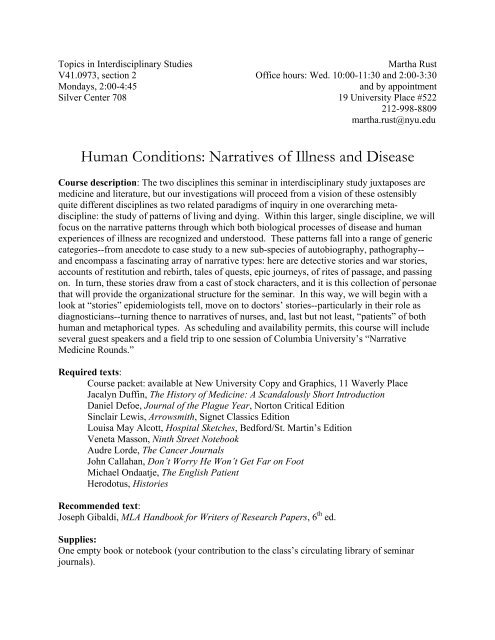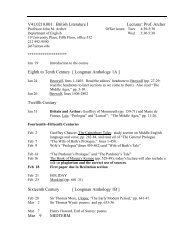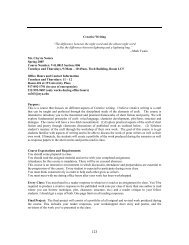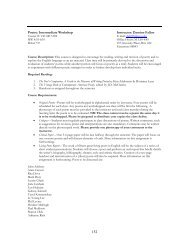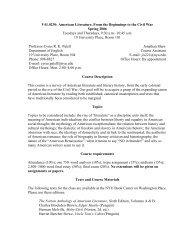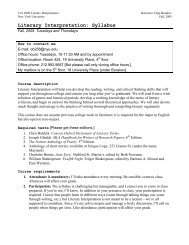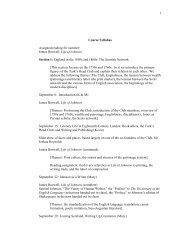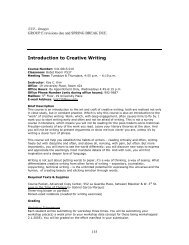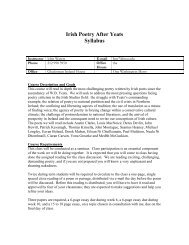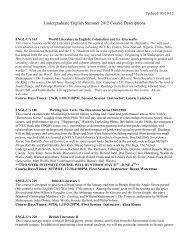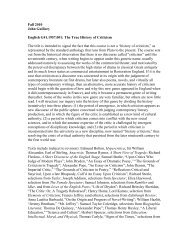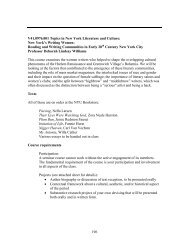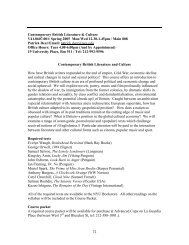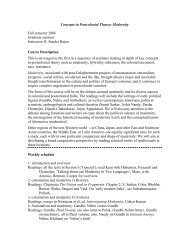Human Conditions: Narratives of Illness and Disease
Human Conditions: Narratives of Illness and Disease
Human Conditions: Narratives of Illness and Disease
You also want an ePaper? Increase the reach of your titles
YUMPU automatically turns print PDFs into web optimized ePapers that Google loves.
Topics in Interdisciplinary Studies<br />
V41.0973, section 2<br />
Mondays, 2:00-4:45<br />
Silver Center 708<br />
Martha Rust<br />
Office hours: Wed. 10:00-11:30 <strong>and</strong> 2:00-3:30<br />
<strong>and</strong> by appointment<br />
19 University Place #522<br />
212-998-8809<br />
martha.rust@nyu.edu<br />
<strong>Human</strong> <strong>Conditions</strong>: <strong>Narratives</strong> <strong>of</strong> <strong>Illness</strong> <strong>and</strong> <strong>Disease</strong><br />
Course description: The two disciplines this seminar in interdisciplinary study juxtaposes are<br />
medicine <strong>and</strong> literature, but our investigations will proceed from a vision <strong>of</strong> these ostensibly<br />
quite different disciplines as two related paradigms <strong>of</strong> inquiry in one overarching metadiscipline:<br />
the study <strong>of</strong> patterns <strong>of</strong> living <strong>and</strong> dying. Within this larger, single discipline, we will<br />
focus on the narrative patterns through which both biological processes <strong>of</strong> disease <strong>and</strong> human<br />
experiences <strong>of</strong> illness are recognized <strong>and</strong> understood. These patterns fall into a range <strong>of</strong> generic<br />
categories--from anecdote to case study to a new sub-species <strong>of</strong> autobiography, pathography--<br />
<strong>and</strong> encompass a fascinating array <strong>of</strong> narrative types: here are detective stories <strong>and</strong> war stories,<br />
accounts <strong>of</strong> restitution <strong>and</strong> rebirth, tales <strong>of</strong> quests, epic journeys, <strong>of</strong> rites <strong>of</strong> passage, <strong>and</strong> passing<br />
on. In turn, these stories draw from a cast <strong>of</strong> stock characters, <strong>and</strong> it is this collection <strong>of</strong> personae<br />
that will provide the organizational structure for the seminar. In this way, we will begin with a<br />
look at “stories” epidemiologists tell, move on to doctors’ stories--particularly in their role as<br />
diagnosticians--turning thence to narratives <strong>of</strong> nurses, <strong>and</strong>, last but not least, “patients” <strong>of</strong> both<br />
human <strong>and</strong> metaphorical types. As scheduling <strong>and</strong> availability permits, this course will include<br />
several guest speakers <strong>and</strong> a field trip to one session <strong>of</strong> Columbia University’s “Narrative<br />
Medicine Rounds.”<br />
Required texts:<br />
Course packet: available at New University Copy <strong>and</strong> Graphics, 11 Waverly Place<br />
Jacalyn Duffin, The History <strong>of</strong> Medicine: A Sc<strong>and</strong>alously Short Introduction<br />
Daniel Defoe, Journal <strong>of</strong> the Plague Year, Norton Critical Edition<br />
Sinclair Lewis, Arrowsmith, Signet Classics Edition<br />
Louisa May Alcott, Hospital Sketches, Bedford/St. Martin’s Edition<br />
Veneta Masson, Ninth Street Notebook<br />
Audre Lorde, The Cancer Journals<br />
John Callahan, Don’t Worry He Won’t Get Far on Foot<br />
Michael Ondaatje, The English Patient<br />
Herodotus, Histories<br />
Recommended text:<br />
Joseph Gibaldi, MLA H<strong>and</strong>book for Writers <strong>of</strong> Research Papers, 6 th ed.<br />
Supplies:<br />
One empty book or notebook (your contribution to the class’s circulating library <strong>of</strong> seminar<br />
journals).
Course requirements:<br />
1. Field trip to Columbia University’s Narrative Medicine Rounds--time <strong>and</strong> date TBA.<br />
2. Weekly entries in one <strong>of</strong> the class’s circulating notebooks.<br />
3. One turn at beginning class discussion.<br />
4. One 7-10 minute in-class presentation.<br />
7. One short (~5 page) paper on an item in the NYU’s special collections library (Fales library).<br />
8. One long (12-15 page) paper that takes an interdisciplinary approach to a topic <strong>of</strong> your choice.<br />
Attendance: The success <strong>of</strong> our investigations this semester will depend in part on the work <strong>of</strong><br />
building intellectual community together; for this reason, regular attendance by all seminar<br />
participants will be crucial. While an occasional absence (two at the most) or late arrival in the<br />
case <strong>of</strong> an emergency won’t lower your grade (or, worse, deprive our community <strong>of</strong> your<br />
insights!) more than that certainly will. Do your best to attend every single class session!<br />
Grades:<br />
Your grade will be computed as follows:<br />
Class participation: 20%<br />
(a reflection <strong>of</strong> your attendance, preparation for beginning class discussion on<br />
your day, <strong>and</strong> your contributions to discussion <strong>and</strong> circulating notebooks)<br />
Short paper: 20%<br />
In-class presentation: 10%<br />
Long paper: 50%<br />
total: 100%
Seminar Schedule<br />
September 12<br />
Introduction: Stories <strong>and</strong> the health-care delivery situation--reading ER<br />
Semiotics - <strong>Illness</strong> - <strong>Disease</strong> - Narrative<br />
September 19<br />
Jacalyn Duffin, “The Fabricated Body” <strong>and</strong> “Technology <strong>and</strong> <strong>Disease</strong>” [from The History<br />
<strong>of</strong> Medicine: A Sc<strong>and</strong>alously Short Introduction]<br />
Arthur Conan Doyle, A Study in Scarlet, chapter 1 <strong>and</strong> “The Musgrave Ritual”<br />
Berton Roueché, “A Game <strong>of</strong> Wild Indians” <strong>and</strong> “S<strong>and</strong>y”<br />
Epidemiologists’ Stories<br />
September 26<br />
Duffin, “Plagues <strong>and</strong> Peoples”<br />
Daniel Defoe, Journal <strong>of</strong> the Plague Year<br />
Benjamin Jonson, “On My First Sonne”<br />
guest: Patrick Phillips<br />
October 3<br />
film: The B<strong>and</strong> Played On<br />
Duffin, “Interrogating Life,” “Science <strong>of</strong> Suffering,” <strong>and</strong> “Why is Blood Special?”<br />
last hour: meet in Fales Library; first paper assigned<br />
[October 10--no class]<br />
Doctors’ Stories<br />
October 17<br />
Duffin, “On Being a Doctor” <strong>and</strong> “A Many Faceted Gem”<br />
Sinclair Lewis, Arrowsmith<br />
October 24<br />
Duffin, “First Do No Harm” <strong>and</strong> “Work <strong>of</strong> the H<strong>and</strong>”<br />
Richard Selzer, “Fetish” <strong>and</strong> “Toenails”<br />
Atul Gaw<strong>and</strong>e, “The Case <strong>of</strong> the Red Leg”<br />
Nurses’ Stories<br />
October 31<br />
Duffin, “Women’s Medicine <strong>and</strong> Medicine’s Women”<br />
Walt Whitman, “The Wound Dresser”<br />
Florence Nightingale, selections from Letters from the Crimea <strong>and</strong> Notes on Nursing<br />
Louisa May Alcott, Hospital Sketches<br />
first paper due<br />
November 7<br />
Duffin, “No Baby, No Nation”<br />
Veneta Masson, Ninth Street Notebook
Patients’ Stories<br />
November 14<br />
Duffin, “Wrestling with Demons”<br />
Audre Lorde, The Cancer Journals<br />
November 21<br />
Arthur Frank, “Asking the Right Question about Pain: Narrative <strong>and</strong> Phronesis”<br />
John Callahan, Don’t Worry He Won’t Get Far on Foot<br />
second paper assigned<br />
November 23<br />
No class; field trip will replace (time, destination TBA)<br />
Charting a Novel<br />
November 28<br />
Michael Ondaatje, The English Patient<br />
Herodotus, Histories (book 1)<br />
Gerald Weissman, “The Chart <strong>of</strong> the Novel”<br />
December 5<br />
The English Patient<br />
“Living with the Bomb”<br />
December 12<br />
film, The English Patient<br />
guest: Pr<strong>of</strong>essor Patrick Deer<br />
December 19: final paper due


